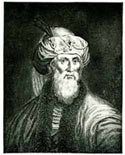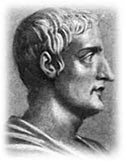
Flavius Josephus
Jewish Historian
(AD 37 – c. 100)
Jewish Historian
(AD 37 – c. 100)
And when Pilate, at the suggestion of
the principal men amongst us, had condemned him to the cross, those that loved
him at the first did not forsake him; for he appeared to them alive again the
third day; as the divine prophets had foretold these and ten thousand other
wonderful things concerning him. And the tribe of Christians, so named from
him, are not extinct at this day. Jewish Antiquities 18.3.3

Cornelius Tacitus
Senator and Roman Historian
(ca. 56 – ca. 117)
Mockery of every sort was added to
their deaths. Covered with the skins of beasts, they were torn by dogs and
perished, or were nailed to crosses, or were doomed to the flames and burnt, to
serve as a nightly illumination, when daylight had expired. Nero offered his
gardens for the spectacle, and was exhibiting a show in the circus, while he
mingled with the people in the dress of a charioteer or stood aloft on a car.
Hence, even for criminals who deserved extreme and exemplary punishment, there
arose a feeling of compassion; for it was not, as it seemed, for the public
good, but to glut one man's cruelty, that they were being destroyed." Annals 15.44
 Lucian
Samosata
Lucian
SamosataAssyrian rhetorician and satirist
(c. A.D. 125 – after A.D. 180)
The Christians, you know, worship a man to this day--the distinguished personage who introduced their novel rites, and was crucified on that account. ... it was impressed on them by their original lawgiver that they are all brothers, from the moment that they are converted, and deny the gods of Greece, and worship the crucified sage, and live after his laws. All this they take quite on faith, with the result that they despise all worldly goods alike, regarding them merely as common property. The Passing Peregrinus
No comments:
Post a Comment